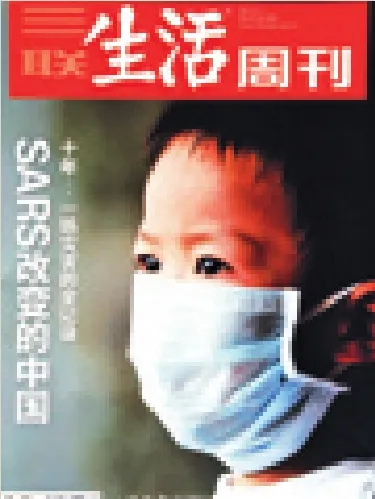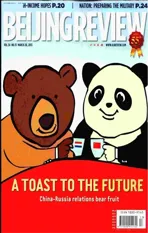THIS WEEK
2013-12-06
BEND IT LIKE BECKS
British footballer David Beckham engages students from Beijing No.2 High School on March 20 during his six-day tour in China to promote the development of football. The star was invited by the Chinese Football Association to serve as ambassador for the local youth football program and the Chinese Super League.
New Start
Premier Li Keqiang presides over the first plenary meeting of the newly elected State Council, China’s cabinet,in Beijing on March 20.
The transformation of government functions will be its first task, Li said. While enhancing macro-level administration, government departments should let go of micro-administrative matters and let the market or society decide, he added.
The event marked the official start of the Central Government’s new term in office, following election at China’s annual parliamentary session earlier this month.
Low-Carbon Certification
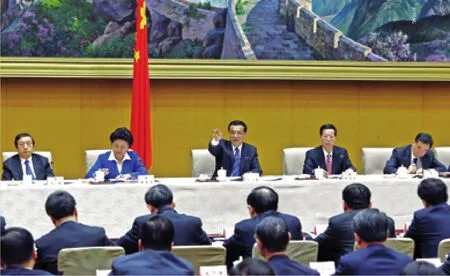
China will build a un ified certification system for low-carbon products as part of efforts to boost consumption of environmentally friendly goods,said the country’s top economic planner.
An independent third-party agency will assess the carbon footprint of products and services and grant low-carbon cert ificates to those that have met certain requirements, according to a document issued on March 21 by the National Development and Reform Commission.
The commission will then issue a catalogue of cert ified products and an ident ification mark will be printed on the products’ packaging, the document said.
The certification scheme is being piloted in the provincial regions of Guangdong, Chongqing and Hubei.
By the end of 2015, China aims to lower its energy consumption per 10,000 yuan ($1,608) of GDP by 16 percent from 2010 and lower its carbon dioxide emissions per 10,000 yuan of GDP by 17 percent.

OD Regulation
To better protect workers’ rights,China has revised a regulation on occupational diseases that ensures more ef ficient diagnostic procedures.
The revised Regulation on Diagnosing and Authenticating Occupational Diseases, released on March 18 by the National Health and Family Planning Commission, allows employees to choose from more health institutions for identifying occupational diseases and simpl ifies the procedures for official con firmation of diagnoses.
Meanwhile, the regulation stipulates that employers are responsible for presenting evidence on occupational disease-related con flicts with their employees, and local industrial safety watchdogs should assist employees in urging
FRESH AND GREEN
A tea farmer presents a handful of freshly picked tea leaves at the Lushan Yunwu Tea Base in Jiujiang, Jiangxi Province, on March 18. Tea leaves picked during spring are reputed to have the best flavor employers to do so.
Some 779,849 cases of occupational diseases had been reported in China by the end of 2011. Last year,the country officially recognized 562 institutions to diagnose such diseases.
The revised regulation will take effect on April 10.
Ethnic Publishing
A book collection on the study of languages of Chinese ethnic minorities has been published to boost the country’s linguistic diversity, the Chinese Academy of Social Sciences(CASS) said on March 18.
The three-volume book, the first of its kind, covers research findings introduced since the founding of the People’s Republic of China in 1949,the academy said.
The work took more than a decade to complete through joint efforts by three generations of linguists, according to the academy.
“The publication has promoted the study of ethnic languages, and also played a good role in protecting endangered languages and boosting the country’s linguistic diversity,” said Chao Ke, Deputy Director of the Bureau of Scientific Research Management of CASS.
CAPPED WHITE
A man takes photos of snow-blanketed trees at the Temple of Heaven in Beijing on March 20
China’s 55 ethnic minorities use about 100 spoken languages and dozens of written forms belonging to the Sino-Tibetan, Altaic, lndo-European and Austro-Asiatic language families.
Quake Warning System
The Chengdu Hi-Tech Disaster Mitigation lnstitute in southwest China’s Sichuan Province is now home to the world’s largest earthquake warning system, according to head of the institute on March 18.
The system was developed with both domestic and foreign technologies, said Wang Tun, director of the institute.
The system covers an area of 400,000 square km, bigger than the 377,000-square-km warning system in Japan. lt is made up of 1,213 monitoring instruments and warning centers in eight provinces including Gansu, Shaanxi, Sichuan and Yunnan.

The system’s reaction time once a quake occurs is an average of 7 seconds, while Japan’s is an average of 9 seconds, Wang said, adding that it integrates television, computers,mobile phones and microblogs for alerts.
Air Monitoring
A national air-quality monitoring network with nearly 950 monitoring stations is expected to be operational in 190 Chinese cities by the end of the year, a senior environmental official said on March 15.
There are plans to build about 440 air-quality observation points in 116 cities this year after 496 such points were built in 74 cities in 2012,said Wu Xiaoqing, Vice Minister of Environmental Protection.
Wu also underlined the serious pollution in south China’s Pearl River Delta, in east China’s Yangtze River Delta and north China’s Beijing and Tianjin municipalities.
The three areas cover about 8 percent of China’s total landmass but discharge five times more air pollutants per square km than other areas, Wu said.
By 2015, the ministry aims to reduce the intensity of PM2.5,air-borne particles measuring 2.5 microns or less in diameter, in those three regions by 6 percent from the 2010 level, he said.
Desalination Trials
The first batch of regions and companies has been selected to carry out seawater desalination pilot programs in China.
lt is the latest move to boost development in the sector. The list, released by the National Development and Reform Commission earlier this month,includes Shenzhen in Guangdong Province, Binhai New Area in Tianjin,Bohai New Area in Hebei Province,and several industrial parks and companies.
China announced a five-year development plan for the seawater desalination sector last year to ease the country’s water shortages.
The country aims to convert 2.2 million cubic meters of seawater into freshwater per day by 2015, compared with 660,000 cubic meters in 2011, according to the 2011-15 plan. lt is expected more than half of freshwater channeled to isles and more than 15 percent of water delivered to coastal factories will come from the sea by 2015.
lndustrial analysts estimated the development plan will require investment of around 21 billion yuan($3.38 billion).
Transport Investment
Southwest China’s Tibet Autonomous Region will invest 22 billion yuan ($3.54 billion) in transport construction this year, a senior regional official said.
A highway from regional capital Lhasa to Nyingchi and four airport highways will be constructed, according to Tashi Gyatso, head of the Tibet Transport Department.
The region will also carry out 194 construction projects to make highways available to 258 villages to reach the region’s goal of linking 99.14 percent of villages to highways.
A total of more than 5,000 km of highways will be completed this year, in addition to the construction of four county-level passenger bus stations and two cargo stations.
The region spent 10.1 billion yuan ($1.62 billion) last year in improving its transport infrastructure,up 18.8 percent year on year.
Sleep Tight
A doctor demonstrates a proper sleeping position in Yuying Kindergarten in Kaifeng, on March 21, Worl Sleep Day. Henan Province.
According to a report released by the Horizon Research Consultancy Group on March 19,Chinese people sleep an average of eight hours and 50 minutes every day.
Some 55 percent of the respondents admitted that occupational pressure has affected their sleep patterns and they have resorted to various methods to improve sleep quality.
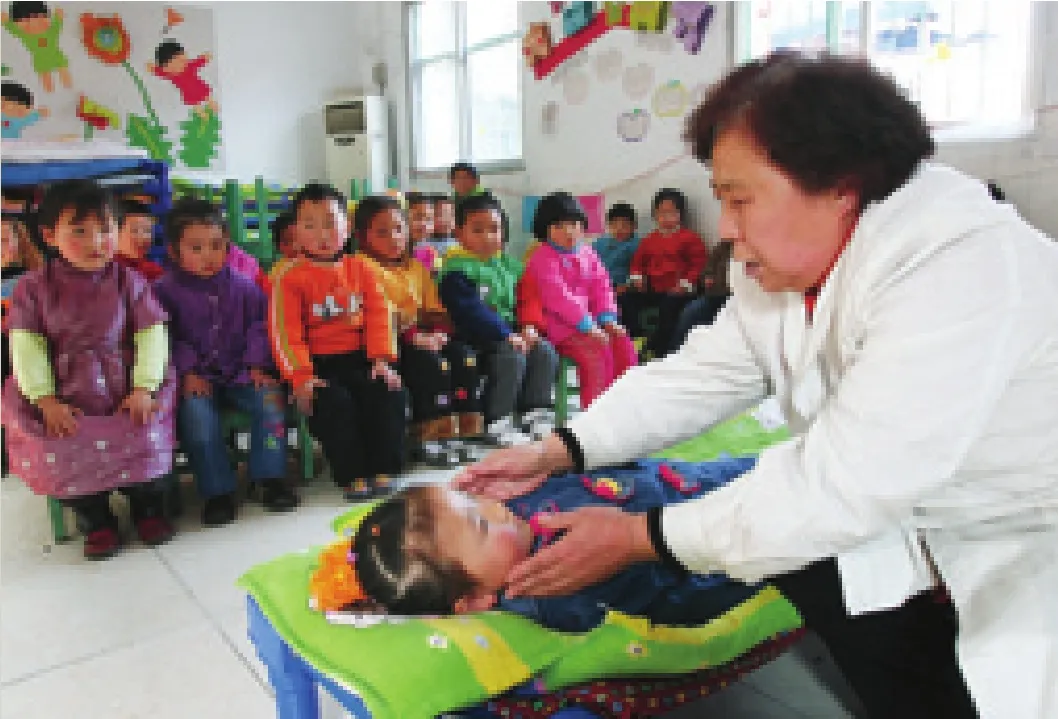
Petro Expo
Domestic and foreign visitors observe a drilling model at the 13th China lnternational Petroleum and Petrochemical Technology and Equipment Exhibition in Beijing.
The petroleum exhibition,the largest of its kind in the world, kicked off on March 19 and has attracted more than 1,500 companies from 62 countries and regions.
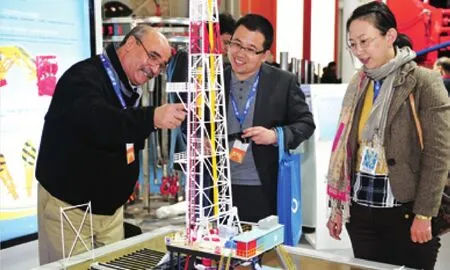
Housing Price Surge
New home prices rose steeply in more Chinese cities in February,putting the government in an increasingly complex situation of regulating the bubble-ridden market.
Of a statistical pool of 70 major Chinese cities monitored by the National Bureau of Statistics, 66 saw home prices increase within 3.1 percent in February from a month earlier, while three saw prices remain unchanged and only one reported price falls.
Newly built commercial housing prices in Beijing and Guangzhou,capital of south China’s Guangdong Province, saw the largest increase of 3.1 percent on a month-on-month basis, followed by Shanghai and Shenzhen with price hikes of 2.3 percent and 2.2 percent, respectively.
Zhang Dawei, director of Centaline Property’s research center,attributed the growth to panicky homebuyers driven into hurried purchases by worries that prices may rise further following the recent gaining streak.
FDI Rebound
China’s foreign direct investment(FDl) stood at $8.21 billion in February, expanding by 6.32 percent year on year. This put an end to a streak of declines for eight consecutive months since June 2012.
“The rebound is a heartening fact,” said Shen Danyang, spokesman of the Ministry of Commerce,adding that it showed the competitiveness of China’s economy and foreign investors’ con fidence in its business environment and growth prospects.
ln the first two months, total FDl in flow dropped 1.35 percent to $17.48 billion from the same period last year.
RECYCLING OIL AND GAS
A staff member introduces a gas station’s recycling system in Shenyang, capital of northeast China’s Liaoning Province. On March 19, all the gas stations in the city started renovation projects on petroleum and gas recycling
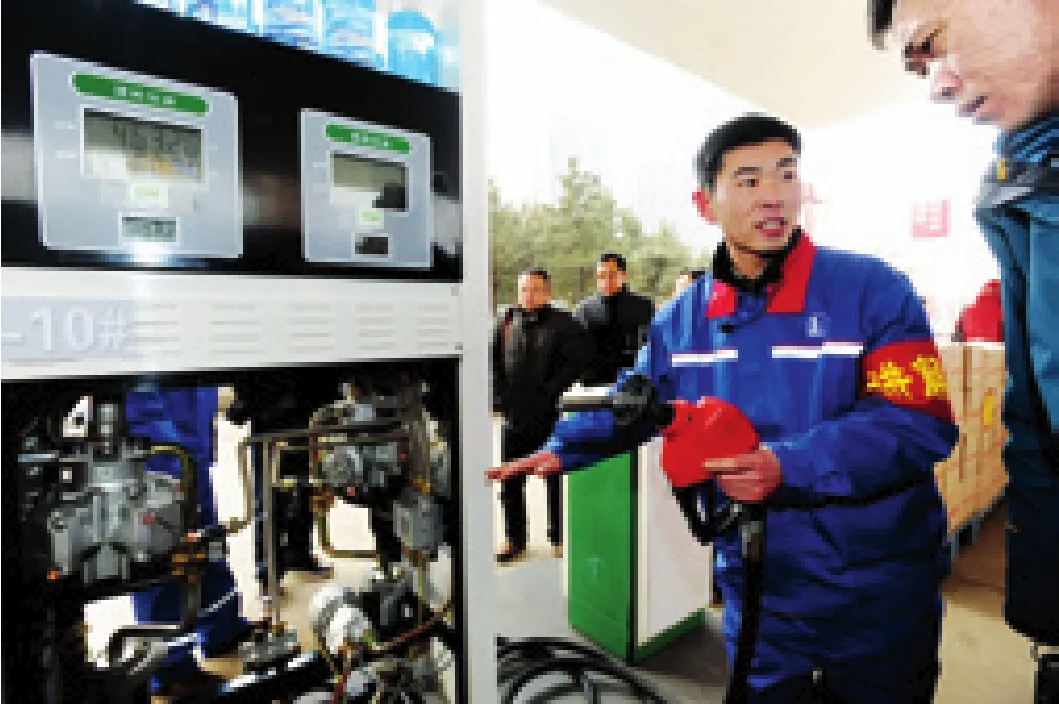
“Our general estimate is that FDl will remain steady for the whole year, which means significant rises and drops are not likely,” Shen said.
Overseas direct investment by Chinese companies, excluding investment in the financial sector,surged by a robust 147.3 percent year on year to $18.39 billion in the first two months.
Confidence Boost
Amid growing public concern about inflation, Chinese entrepreneurs and bankers are more con fident about the country’s economic outlook.
The entrepreneurs’ con fidence index rose 7.6 percentage points to 68 percent in the first quarter this year from the fourth quarter in 2012,the People’s Bank of China (PBC)said in a report, citing results from a survey of over 5,700 local entrepreneurs.
ln a separate report based on a survey of 3,100 bankers, the PBC said their con fidence index was up 17.2 percentage points to 72.2 percent from the previous quarter.
Though the country’s economy is improving, the PBC survey found that more people are concerned about price rises.
WORLD’S LIGHTEST
A professor from Zhejiang University demonstrates the all carbon aerogel developed by the university. The density of the material is only 0.16 milligrams per cubic centimeter, making it world’s lightest material to date

Of the 20,000 savers the bank surveyed, around 62.1 percent considered prices high, while 68 percent described housing prices as “high and hard to accept.”
A research report released on March 19 warns of growing pressure on essential resources in a densely populated area in north China.
With a population of 104 million,the Beijing-Tianjin-Hebei Province region is currently facing grave tensions in water supplies and garbage processing, according to a blue book issued by the Chinese Academy of Social Sciences.
ln Beijing, per-capita water resources stood at 119 cubic meters in 2011, much lower than the internationally recognized water shortage warning line of 1,000 cubic meters.Tianjin and Hebei also face a similar situation.
The report also forecasts that Beijing will have to allocate another 213 hectares of land to bury additional garbage by 2020.
Meanwhile, the size of the population in the region, which is already contributing to these issues, will further expand. The report estimates that the region would be home to 112 million people by 2015, although the ideal population should not exceed 98 million.
Beijing New Airport
Beijing plans to build a new airport in its southern suburbs in Daxing District, which borders Hebei Province.
Construction on the new airport is expected to start in 2014, and preparation work is already underway, said Shao Heng, deputy chief of the government office of Daxing District, on March 19.
The new airport will serve as an engine for Beijing’s economic development and a new landmark for the capital, according to the Beijing Municipal Commission of Development and Reform.
Meanwhile, an air transportrelated economic zone is also planned, with an investment of 84 billion yuan ($13.39 billion), Shao said.
Upon completion, the new airport is expected to alleviate traffic pressure on the Beijing Capital lnternational Airport, which remained the world’s second busiest airport in 2012 in terms of passenger throughput.
Highest-Volt Transformer
A 397-ton transformer was carried to a dock in Huzhou, east China’s Zhejiang Province.
The 3,000-megavolt transformer, the largest in capacity in China, will be transported to the Zhejiang North Transformer Substation and will become an important link in the power transmission project from Huainan, Anhui Province to Shanghai.
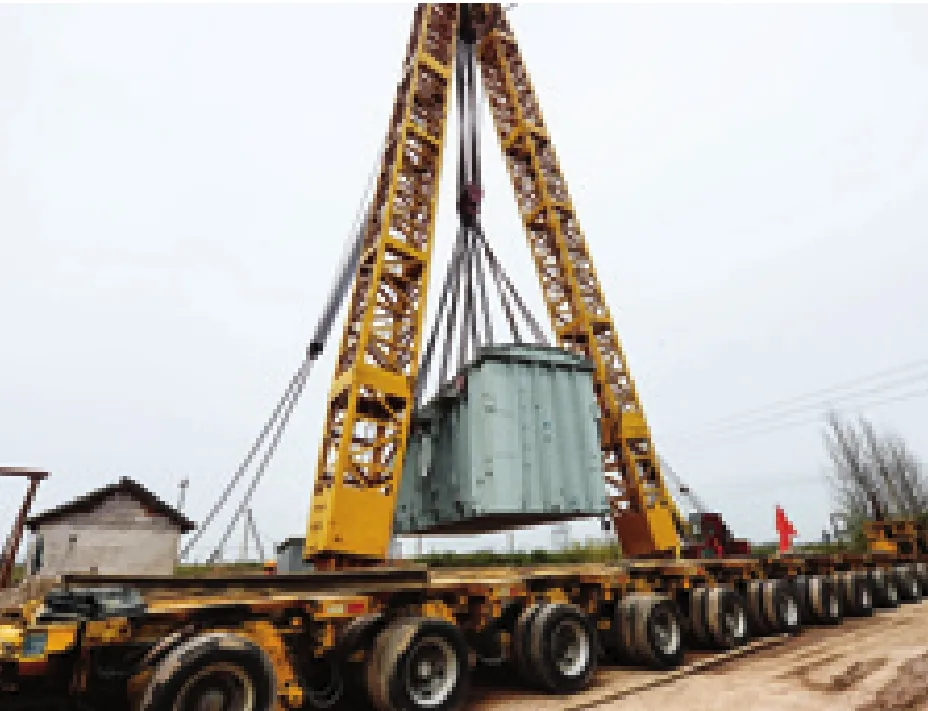
Numbers
$1.18 tln
The value of China’s exports of mechanical and electronic products in 2012,taking up a greater share of the global market
4,400
The number of FJ Cruiser vehicles that Japanese automaker Toyota will recall in China over seat belt flaws
22 bln yuan
Money that Tibet Autonomous Region will invest in transport construction this year
$1.59 bln
The amount of trade between south China’s Guangxi Zhuang Autonomous Region and ASEAN in January and February
Resource Shortage
UNITED ARAB EMIRATES
Sheikh Khalifa Bin Zayed Al-Nahyan (center), President of the United Arab Emirates, inaugurates Shams 1, the largest concentrated solar power plant in the Middle East, in the desert of Abu Dhabi on March 17


CYPRUS
Cypriot security guards stand outside the parliament building in Nicosia on March 18,the day before lawmakers rejected an EU bailout deal that slaps a levy on bank savings
JAPAN
Pedestrians admire cherry blossoms along a bridge in Tokyo on March 20. viewing cherry blossoms is a national pastime and popular cultural activity in Japan

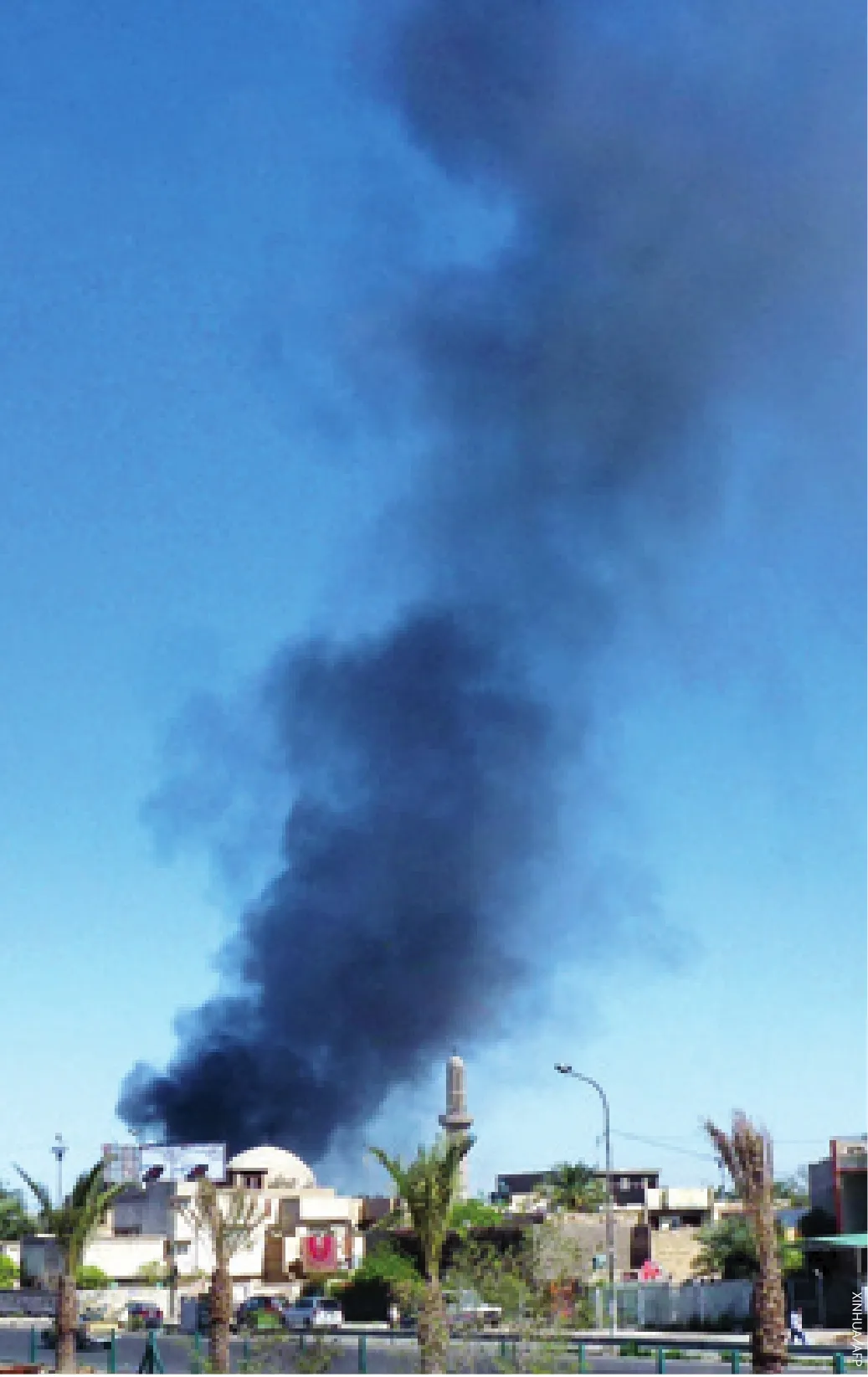
IRAQ
Smoke billows from the site of a blast in Baghdad on March 19. A wave of car bombings and shootings struck the Iraqi capital on the eve of the 10th anniversary of the U.S.-led invasion of Iraq
THAILAND
A visitor poses with a wax figure of Steve Jobs, the late co-founder of Apple Inc., at the Madame Tussauds Museum in Bangkok on March 19


UZBEKISTAN
Dancers perform at a ceremony celebrating Nowruz, or the Persian New Year, in Tashkent on March 19
“If the Central Government refuses to cover part of the debt, the corporation will have no choice but to raise ticket prices. Some fares for high-speed lines will probably cost more than airline flights.”
Wang Mengshu, deputy chief engineer of the China Railway Tunnel Group and a member of the Chinese Academy of Engineering, commenting on the huge debt of the just dissolved Ministry of Railways at the annual session of the National People’s Congress in March
“People’s craze for English learning has wasted education resources and threatened the study of Chinese.”
Zhang Shuhua, Dean of the Information and Intelligence Institute at the Chinese Academy of Social Sciences, speaking at a meeting during the annual session of the 12th National Committee of the Chinese People’s Political Consultative Conference in March
“The cause of cancer is not entirely clear,but a large number of investigations and basic research have con firmed that it is closely related to the degree of pollution in the environment in which we live, the air we breathe, the water we drink, the food we eat and the lifestyles we lead.”
Hua Yawei, deputy head of the Henan Tumor Hospital, calling for the introduction of a pollution index directly related to human health
“School performance should be evaluated in a comprehensive manner, not solely on students’ test scores.”
Liu Limin, Vice Minister of Education, commenting on a recently launched national campaign aimed at alleviating students’ heavy workload
RETIRED PARTY CHIEF DIES
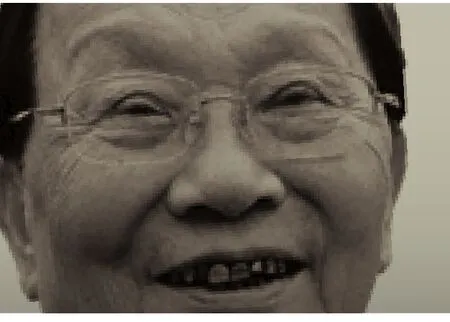
Wu Renbao, retired Communist Party of China chief of Huaxi Village in east China’s Jiangsu Province, died of cancer at the age of 85 on March 18.
With annual sales revenue of more than 50 billion yuan($7.93 billion), the village is one of the richest in the country.Wu worked hard over the past decades to turn the once poverty-stricken area into a well-off village featuring villas, cars and a high per-capita income.
He has been hailed as an outstanding example among the country’s many rural Party leaders.
CENTRAL BANK GOVERNOR
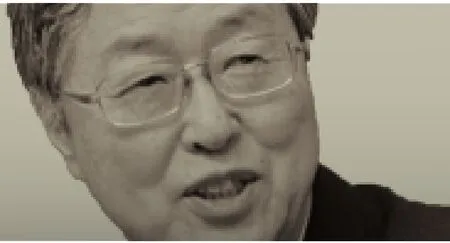
Zhou Xiaochuan, China’s central bank governor,was voted, although not unanimously, by the National People’s Congress deputies to extend his tenure on March 16, making him the longestserving official for that position.
Under his watch, China has successfully steered the four state-owned banks from the brink of bankruptcy into listed commercial lenders, loosened the reins on its currency and accelerated the opening up of its capital accounts.
At a press conference held on March 13, 65-yearold Zhou said the priority this year is to guard against inflation and the country should be on high alert for rising prices.
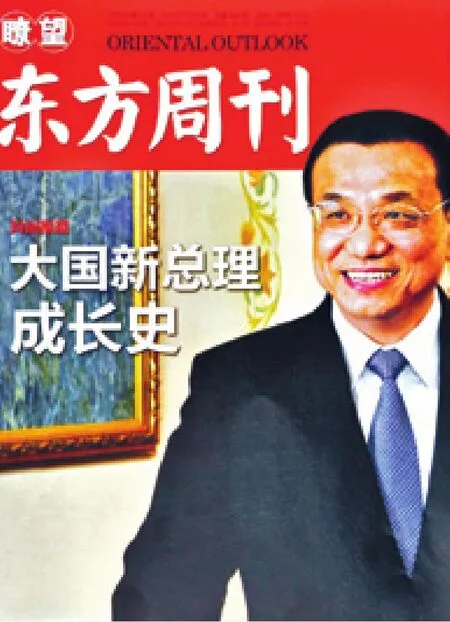
Trajectory of the New Premier
Oriental Outlook
March 21
Oriental Outlook reviewed the growing path of China’s newly appointed premier Li Keqiang.
Before being admitted to study law at Peking University (PKU) in 1978, Li had been among millions of zhiqing—young people trekking from cities to the countryside to work alongside farmers in the fields during the “cultural revolution” (1966-76).
Although he majored in law in university, he had a strong interest in economics and paid close attention to economic developments during China’s reform and opening-up in the late 1970s.He later studied economics at PKU and acquired a doctor’s degree in economics there in 1994.
Li adores English. He translated The Due Process of Law by famed English jurist Lord Denning into Chinese. He is also one of few state-level officials in China who delivers speeches or communicates in the language.
Li said that 10 years’ study at PKU has taught him to pursue truth. “l was searching for not just knowledge, but was also learning how to mould a temperament, to cultivate a scholarly outlook.”
Seen as pragmatic, Li has persisted in combining theoretical research with reality and trying to keep the balance between the two.
“The Chinese nation has suffered numerous hardships in the past century. Now, as we are only several steps away from reviving the nation, we should shoulder great responsibilities and stride forward,” he said.
At a meeting that Li presided over one week after the 18th National Congress of the Communist Party of China, he clearly sent out a signal of deepening reform. He said reform is the biggest dividend, which is regarded as the new leadership’s guideline in pushing forward change.
Blood Supply Shortage
Guangzhou Daily
March 18
Sun Jun, Director of Jiangsu Province Blood Center, said the provincial blood supply shortage cannot be eased in the short term.
The blood supply shortage has become a problem across the country, caused by the public’s unwillingness to donate blood.Adequate information has not been publicized about the safety of donating blood, creating reluctance and even fear. On the other hand,the voluntary donation system itself has shortcomings and lacks an incentive mechanism.
According to law, donors and their direct relatives can obtain free blood when needed.However, the procedure remains complicated.
The lack of material compensation for donors is another concern while, at present, no law or regulation stipulates that accidental injury caused by donating blood will be compensated.
In a word, to address the blood supply shortage, the country should establish and improve incentives to donate and give donors due compensation.
A Market-Oriented Railway
Beijing Times
March 19
After the restructuring plan of the Ministry of Railways (MOR) was settled, rumors ran that train ticket prices would rise. However, the Lanzhou Railway Bureau said it would sell tickets of some often empty sleeping berths at discounted prices from March 15 to the end of the year.
On hearing the news, netizens remarked that the discount could be a direct benefit from MOR restructuring. However, such practice had been followed since 2009 already. Nevertheless, with the establishment of China Railway Corp., ticket discounts will become commonplace in the future.
Since the railway will become market-oriented, the public should prepare for fluctuating ticket prices.
The corporation should also make enough preparations. In a market environment, the price should not only be determined by supply and demand, but also by service quality. It should first of all guarantee demand for tickets by transforming the current ticket selling method.
If the corporation continues to view itself as a monopoly company and fails to improve service quality,the goal of restructuring the sector will be frustrated and public expectations for other reforms dimmed.
SARS Changed China
Lifeweek
March 11
Ten years ago, when SARS broke out across China, the Central Government mobilized various resources to counteract the disease. The epidemic highlighted the importance of public health and lead to increased investment within the sector and a new disease control system. It also focused attention on the ability to combat crisis as one of a country’s core capabilities.
Human history is wrought with the constant struggle against disease. Today, public health problems, such as poisoned capsules, water pollution and smog, pose fresh challenges.
On the heels of progress, Lifeweek sent journalists to interview people in Guangdong Province and Hong Kong and conducted individual case investigations at several medical institutions in Beijing, hoping to record the public health event of a decade ago and find out its impact on people today.
